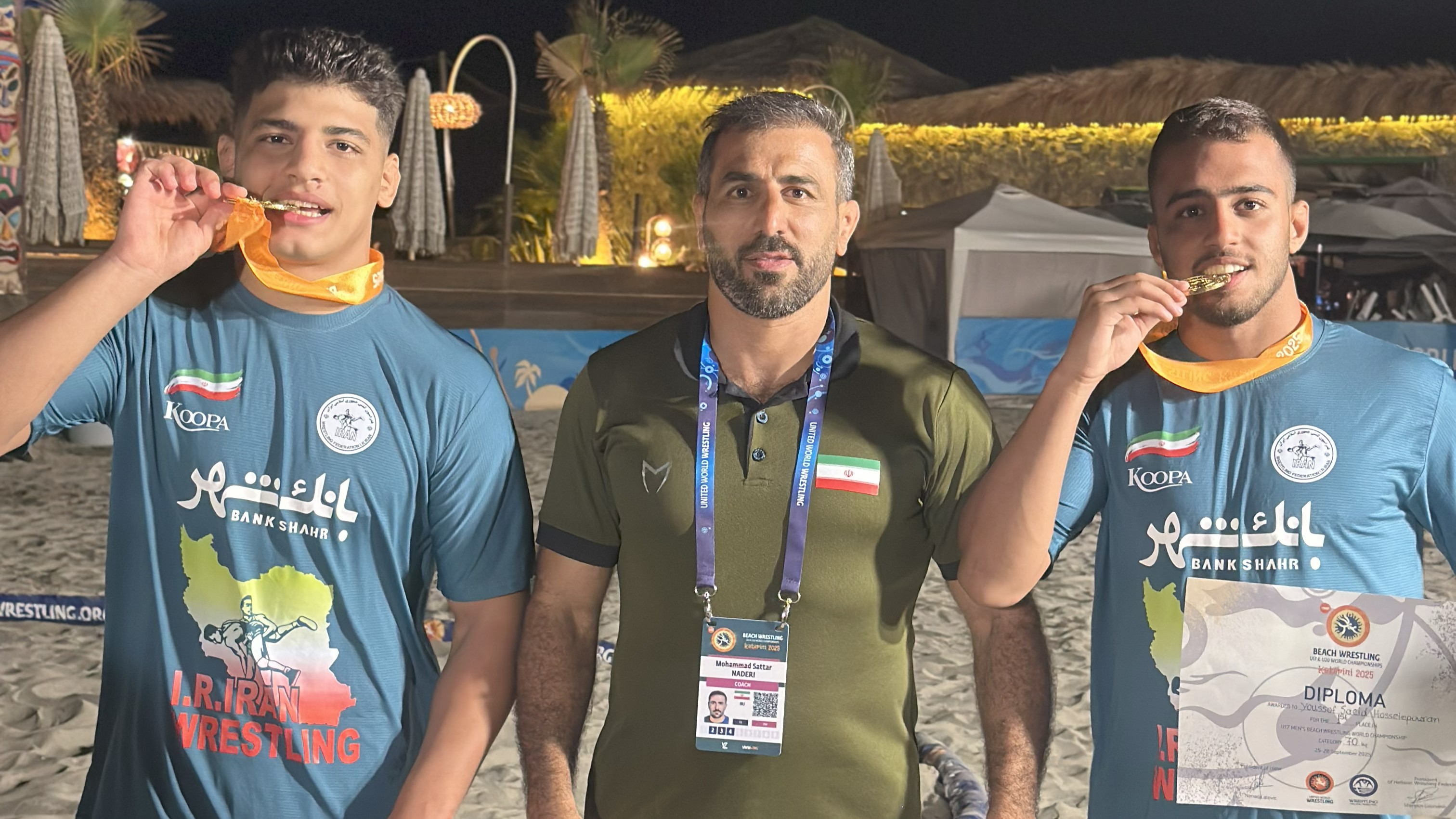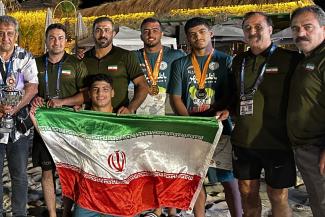KATERINI-PIERIA, Greece (September 27) -- Iran’s return to Beach Wrestling after an eight-year absence could have been cautious. Instead, it was commanding.
Iran won four medals, including two golds, to claim the men’s team title at the U17 World Beach Wrestling Championships after a close race with Georgia, which finished second with 75 points to Iran’s 80. Azerbaijan was third with 62 points.
In the women's category, hosts Greece managed to go past France to finish first with 50 points while France ended up second with 42. The United States was third with 32 points.
The U17 World Championships is a significant stop in Beach Wrestling as it will be taken into consideration for while awarding the quotas for the 2026 Youth Olympic Games.
 Iran's two gold medalists in Greece, Mahdi FOTOUHI (IRI), left, at 90kg and Youssof HOSSEIN (IRI), right, at 70kg.
Iran's two gold medalists in Greece, Mahdi FOTOUHI (IRI), left, at 90kg and Youssof HOSSEIN (IRI), right, at 70kg.
Gold medalists for Iran, Youssof HOSSEIN (IRI) at 70kg and Mahdi FOTOUHI (IRI) at 90kg, were competing in Beach Wrestling for the first time but never let their inexperience affect their performances.
Hossein, who defeated Stefan MUNTEAN (MDA) in the knockout match, was placed in Group D with Yuki UEDA (JPN), Nikolaos PAPADOPOULOS (GRE) and Ilie TURCAN (MDA). He defeated Papadopoulos 3-1 in the group bout before blanking Turcan 3-0 in just 40 seconds. He was quicker against Ueda, winning in 34 seconds.
Facing Luka MAKHARADZE (GEO) in the quarterfinals, Hossein scored a 3-1 victory and took only 40 seconds to beat Rashad ALIYEV (AZE) in the semifinals.
In an all-Iran final, Hossein fell behind 1-0 against Ilyar VEGHARI (IRI) but stormed back with two straight points with a knee and head touch from Veghari. He used a lateral drop as his final move to win 5-1. Veghari's lost challenge added to Hossein's score and made it 6-1.
Fotouhi was even more dominant at 90kg, winning all three of his group bouts via fall. Charilaos CHAITIDIS (GRE) survived getting pinned in the quarterfinals but Fotouhi was strong enough to win 3-0 and advance to the semifinals.
After winning the semifinal 2-1 against Elgun KARIMLI (AZE), Fotouhi was back to his dominant self and slammed Joni SHAORSHADZE (GEO) to pick his fourth fall in six bouts and the gold medal for Iran.
Fotouhi began with a step out to earn his first point of the final. Both wrestlers arm-locked each other and tried to throw at the edge but it was Shaorshadze who touched outside first which gave Fotouhi his second point.
In one of those moments when his Freestyle instincts took over, Fotouhi went for duckunder and touched his knee on the sand which gave Shaorshadze a point to make the score 2-1. The Georgian tried a fireman carry in the final 10 seconds but Fotouhi pancaked him for a fall.
At 60kg, Mykyta KUZMENKO (UKR) defeated Rati BERIDZE (GEO) twice, first in the group stages and then in final, to claim the gold medal.
Kuzmenko blanked all his opponents barring Beridze who managed to score one point when the two met in the Group B bout. However, the Ukrainian improved and gave no chance to Beridze in the final, winning 3-0.
The Ukrainian was quick to score two step-outs and lead 2-0 and when Beridze tried to score a point, Kuzmenko snapped him down and scored his third and winning point.
Georgia had another silver medalist, Nuradin MUSTAFAEV (GEO), who suffered a one-sided loss in the 80kg final to Nihad SULEYMANLI (AZE), who had represented Azerbaijan at the U17 World Championships in Athens in August.
Suleymanli did not give up a single point in the tournament and won the final against Mustafaev 3-0. He scored a step-out to open the scoring in the final before Mustafaev fell on the ground to give a second point. The Georgian wrestler tried tripping Suleymanli but instead gave a takedown for one point to drop the final.
 Azerbaijan's first-ever gold medalist Ulviyya MUSAYEVA (AZE) with other team members.
Azerbaijan's first-ever gold medalist Ulviyya MUSAYEVA (AZE) with other team members.
Historic golds for Puerto Rico, Azerbaijan
In the women's category, Puerto Rico and Azerbaijan earned historic golds as four different countries crowned champions.
Heklanys RIVERA (PUR), the first woman to compete in Beach Wrestling for her country, made a stunning run to the gold medal at 45kg. She did not give up a single point in six bouts including the final.
Taking on Kaltouma SALISSOU (FRA) in the final, Rivera was put on the 30-second activity clock. With eight seconds remaining, Rivera used an underhook to get the first takedown for a point.
The second point was awarded to Rivera when Salissou committed a foul by grabbing Rivera's shorts. The winning takedown was similar to the first one as Rivera moved from underhook to tripping Salissou.
For Azerbaijan, 15-year-old Ulviyya MUSAYEVA (AZE) needed only 16 seconds to create history. She defeated last year's champion Reisa KOJIMA (JPN) via fall in the 55kg final. Kojima tried hitting a lateral drop in the final but fell on her back, which gave Musayeva three points for the win.
Earlier, Musayeva had lost one of the group bouts against Mia KOVAC (CRO) via fall but rebounded to win all remaining bouts to make the final and then capture the gold medal.
Hosts Greece, which won the team title, earned the gold medal at 75kg through Elena ZAIMIDOU (GRE) who scored a 32-second victory via fall over Madeline HAYDEN (USA) in the final.
Zaimidou, who has competed and won gold in Grappling at the European level, secured three victories via fall, and a victory via superiority over Merily VAESTER (EST) in the semifinals.
In the gold medal bout, Hayden stunned the local fans when she hit a beautiful over-the-head suplex on Zaimidou. Hayden went for a second suplex, but Zaimidou blocked her, using a headlock, and Hayden fell on her back which gave Zaimidou three points and the victory.
Hayden challenged the scoring but the points were confirmed on review and Zaimidou was awarded a point for lost challenge, which made her score 4-1.
European bronze medalist in Women's Wrestling, Alexandra MOISEI (MDA) earned the gold medal at 65kg after some nervous wins. She defeated Thea ROUSSEL (FRA), 3-0, in the final in 49 seconds using three easy snapdowns.

 A tree plantation drive was also conducted in Sarigerme. (Photo: United World Wrestling)
A tree plantation drive was also conducted in Sarigerme. (Photo: United World Wrestling)

 Iran's two gold medalists in Greece, Mahdi FOTOUHI (IRI), left, at 90kg and Youssof HOSSEIN (IRI), right, at 70kg.
Iran's two gold medalists in Greece, Mahdi FOTOUHI (IRI), left, at 90kg and Youssof HOSSEIN (IRI), right, at 70kg. Azerbaijan's first-ever gold medalist Ulviyya MUSAYEVA (AZE) with other team members.
Azerbaijan's first-ever gold medalist Ulviyya MUSAYEVA (AZE) with other team members.
Share your thoughts.
Comments